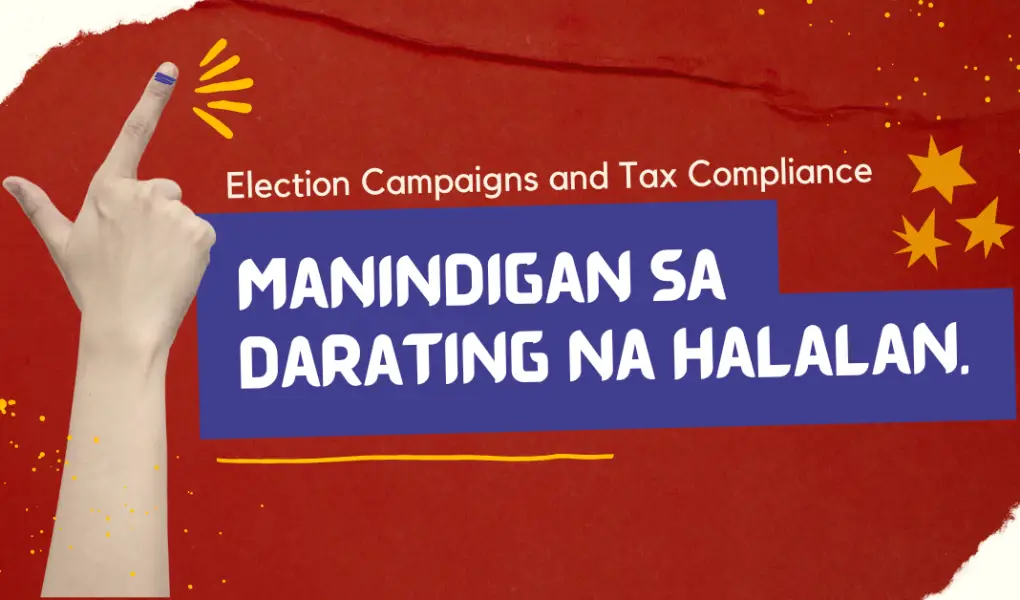Elevate your campaign strategy! Learn how tax compliance can be a winning factor in elections.
In the hustle and bustle of election seasons, it’s easy to get lost in the excitement of politics. But as a responsible candidate, political party, or campaign contributor, understanding and adhering to tax compliance requirements should always be a priority.
Revenue Memorandum Circular (RMC) 31-2019 reiterates the essential tax compliance requirements for candidates, political parties/party-list groups, and campaign contributors in the Philippines.

BIR Registration
First and foremost, every candidate, political party, or campaign contributor must ensure their registration with the Bureau of Internal Revenue (BIR). This registration should align with the guidelines outlined in Revenue Memorandum Circular No. 38-2018, dated May 03, 2018. Candidates should register as “Professionals” to obtain an Authority to Print Receipts/Invoices.
Annual Registration Fee and Certificate of Registration
Candidates and political parties/party-list groups are required to pay an Annual Registration Fee (ARF) amounting to P500. Notably, individual candidates who aren’t engaged in business no longer require a Certificate of Registration (COR).
Registration of Books
Political parties/party-list groups must maintain comprehensive accounting records, including a Cash Receipts Journal and Cash Disbursements Book. Individual candidates can opt for a simplified set of bookkeeping records, provided they offer accurate information.
Invoicing Requirement
It’s essential for all candidates and political parties/party-list groups to register Non-VAT Official Receipts (ORs) for all contributions, whether in cash or kind, at Fair Market Value.

Preservation of Accounting Records
Every political party/party-list group and candidate is responsible for preserving records of contributions and expenditures, along with related documents, for a minimum of three (3) years from the end of the taxable year in which the election took place.
Tax Treatment of Campaign Expenditures
Payments made by political candidates, political parties, or party-list groups for campaign-related goods and services are subject to a 5% creditable withholding tax. The payee will receive BIR Form No. 2307 (Certificate of Creditable Tax Withheld at Source).
Candidates and political parties/party-list groups should:
Remit the 5% Creditable Withholding Tax (CWT) for the first two months of the quarter by the 10th day of the following month using BIR Form No. 0619-E.
File and pay the quarterly withholding tax return by the last day of the month following the quarter’s close using BIR Form No. 1601-EQ, along with the submission of the Quarterly Alphalist of Payees (QAP) through the BIR’s eSubmission facility.
File the Annual Information Return of Creditable Taxes Withheld (Expanded)/Income Payments Exempt from Withholding Tax (BIR Form No. 1604-E), along with the Statement of Contributions and Expenditures, before March 1 following the election year.
Expenses not subject to the 5% CWT cannot be claimed as deductions from campaign contributions and should be reported as unutilized campaign funds subject to income tax.
Tax Treatment of Campaign Contributions
Donations/contributions utilized during the campaign period, as defined by COMELEC, are exempt from donor’s tax. Contributions used before or after the campaign period are subject to donor’s tax and are not deductible as political contributions by the donor.
Income Tax
Unutilized or excess campaign funds, after deducting campaign expenditures, must be included in the candidate’s or political party’s taxable income in their Income Tax Return (ITR). No further deductions, whether itemized or optional, are permitted against this taxable income.
Candidates and political parties failing to file the required Statement of Contributions and Expenditures with COMELEC are automatically precluded from claiming deductions from campaign contributions. This makes the entire amount directly subject to income tax.
Post-Election
Within 30 days after the election, every candidate and Treasurer of political parties/party-list groups must submit the Statement of Contributions and Expenditures to both COMELEC and the relevant Revenue District Office (RDO). RDOs will maintain lists of all registered candidates and political parties/party-list groups for post-election monitoring and registration updates.
Transparency and Accountability
In the democratic process, transparency and accountability are paramount. As candidates, political parties, or campaign contributors, understanding and complying with tax requirements is not just a legal obligation but a civic duty.
By following the tax compliance requirements, you can contribute to fair and honest elections, ensuring that the voice of the people is heard while upholding the integrity of the electoral process.
So, as you embark on your political journey, keep these tax guidelines in mind, and let your commitment to compliance shine as brightly as your campaign promises.




This is very interesting! We often think there are no requirements for election candidates, we’re so wrong…The compliance requirements are often very complex.
This is very interesting and exciting to me. I had no idea how complicated the tax compliance is for election candidates but it does make sense to me.
Wow – there is so much involved with understanding campaign contributions. I learned quite a bit reading this article.
I think the politicians over here in the USA could use this guide or a guide like it. So many of them get into trouble! LOL
Ooohhhh…this is good of you to share this info on tax compliance. Many times, politicians give the excuse of not having been able to handle this simply because of the busy campaign trail. We can always comply duly and on the road.
Oh wow, I think the structure and information is good. It’s nice to know what you’re getting into before you decide to start anything.
This is really helpful. I think many candidates are not even aware of this. Thank you for sharing this guide. This is good to know.
I’ve been thinking about running for city council someday. While these are not rules for the US, I think some of the concepts would be helpful to know.